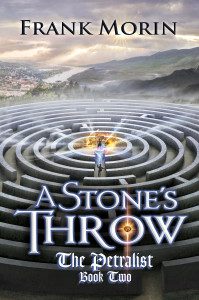A guest post from Joy Dawn Johnson.
When I was approached to write a guest post about how my life experiences have shaped my writing, I almost said no. Not because I’ve never written a post before (I write fiction, not blog about real stuff—especially not about myself), nor because I don’t have a life…or experiences. It’s because some things are too painful and raw to think about, let alone display for the world. But if I’m going to move people with my writing, I have to be willing to go there.
My current work in progress is about a genetically engineered, genderless sixteen-year-old known only as 31 who struggles to choose a gender and find love. But when 31 breaks the selection process, 31 is forced to decide which of them will be recycled into genetic waste and which will live to become the future leaders of society.
I’ve heard dozens of times that it’s best to write what you know. I’ve never been genderless, but some of my most painful memories relate to my own gender identity struggles. I’ve learned to use those memories and experiences to fuel my writing.
Looking back, I still cannot pinpoint the exact reason I decided to play football–the most male dominated sport there is. It wasn’t because I had a passion for football exactly (though I’ve always had a soft spot for contact sports) or wanted to make a point. Looking back, I think I was trying to understand myself. Understand a side of me I had never explored, something inside me that playing football opened up.
In the late 90s, girls playing football were unheard of—especially in high school, on the varsity team, in a southern town like Norman, OK where football is sacred. My team hated me. Even those that I hung out with and were my “friends” harassed me on the field. In fact, sometimes they were the most verbally abusive. I was even dating one of my teammates for nearly a year before he would outwardly admit it to anyone (months after the season had ended). He was too embarrassed to even hold my hand. Looking back, he was a straight up idiot. They all were.
I wish it stopped there. The team was also physically abusive and NOT ONCE did any of them stand up for me, and tell the others to back off. They had such a problem with a female doing something that in their minds was purely for males that not one of them stood up to be a man. Any chance they had, they would take cheap shots. I don’t mean a punch to the arm. They would get in my blind spot and full out tackle me while I was standing in line or walking to the next station. Slamming me onto the concrete or against the fence must have scored them double points. Recently in the news, there has been a lot of discussion regarding helmet collisions. For me, that was a daily thing. The guys would go out of their way to hit my head. And it’s not like they would do this behind the coaches’ backs. The coaches encouraged it.
It started as headaches. Sometimes the pain was so intense that I thought my head would explode. My neck and back were messed up, too. One time, when one of the guys was going for what I can only guess was a curb stomp, I tried to get out of the way and his cleat scraped everything off my shin down to the bone. Instead of helping, the coaches yelled at me, the trainers refused to help. I couldn’t even stand. Finally, my body recovered from the shock and I wrapped it up myself and finished practice. Not long after, one of the guys cheap-tackled me, aiming his helmet at my face. He caught my chin and split it open. The coaches and trainers wouldn’t help but couldn’t ignore the fact that my white uniform was now a sheet of red. I went to the emergency room. The doctor pressed and I finally divulged my symptoms. After some scans, he told me that I’d had multiple concussions and if I continued playing, I could get paralyzed. I’m not a quitter and getting run off was the last thing I ever wanted. It felt like they won. It still feels that way, sometimes.
It wasn’t like I was a total butch or anything. The same year I played football, I won Miss Teenage Oklahoma, was a national finalist and won Miss National Congeniality—very accepted by the girls. You’d think that having Miss Oklahoma in the school would turn some heads but I’d already been labeled as an outcast. I won national dance and cheer titles and went on to be a cheerleader in college. Nothing mattered. To them, I was forever the freak who played football.
In college, I was still drawn to understand myself. I took honor’s gender studies and discovered that while I was female on the outside, I was more like a male on the inside. It made sense and I was relieved, but I didn’t know what to do with the information, didn’t know there was anything I could do. Gender fluidity wasn’t openly discussed back then.
Today, going against the norm is more acceptable. Being “different” can sometimes be “in.” Though being different for different sake is about as bad as people who conform to match everyone else’s desires until they’re unrecognizable even to themselves. With empathy comes truth that isn’t always what we want or like and it may not be what’s accepted. It’s about you being true to you.
If I help even one person to not be afraid, to be stronger, to see who they truly are, to not have to go through even a fraction of what I did, everything I’ve been through would be worth it. I’m not telling my personal story in my young adult Sci-fi novel, Smooth. Smooth is about it being okay to be different. It’s about acceptance and being open, even when you don’t understand, because you never know when you might need someone to be there for you. But most of all, it’s about being true to yourself.
It’s hard digging down to the very core of who we are, to get close enough to painful memories to use them in our writing. Find the courage to connect with the emotion of those experiences and tell your story, in your own way. I hold onto knowing that the more I can tap into that scared, determined girl and let her tell her tale, the more it makes everything worth it.
 Joy Johnson bio:
Joy Johnson bio:
Shortly after receiving her BFA and MBA, Joy Dawn Johnson worked as a project manager for more than ten years, including a stint in Baghdad, Iraq, as a government contractor. She is a member if the Society of Children’s Book Writers and Illustrators and was the 2015 recipient of the Superstars Writing scholarship. Joy typically writes middle grade and young adult Sci-fi and fantasy. She will begin to query agents later this year with her current work in progress, Smooth.
Read the first chapters of Smooth: JoyDawnJohnson
Website: joydawnjohnson.com
Twitter: JoyDawnJohnson
Follow and chat with Joy live on Twitch: Joylovin








